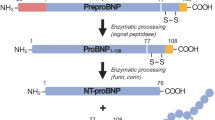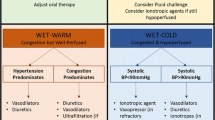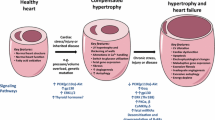Abstract
Background
Evidence shows that proinflammatory cytokines are important determinants of assessment of severity and prognosis of chronic heart failure (CHF).
Aims
We investigated whether peripheral expression of the proinflammmatory factors, TNF-α and IL-6 can predict variable of clinical assessment of patients with CHF.
Methods
In this report, we used real-time PCR assay to compare relative gene expression of TNFα and IL-6 in PBMC from CHF patients with various heart diseases (n = 42, EF < 45%, NYHA I to IV) and matched healthy control subjects (n = 42).We also determined the TNFα and IL-6 concentrations of cell culture supernatant of PBMCs with ELISA.
Results
There was a significant negative correlation between gene expression of TNFα and LVEF(r = 0.4, p < 0.05). Patients with CHF had increased gene expression of TNFα and IL-6 in PBMCs (p < 0.05). They also had elevated the supernatant levels of these cytokines in cultured PBMCs (p < 0.001). Levels of TNFα and IL-6 were increased in ischemic heart disease compared to non-ischemic heart disease. There was a positive correlation between TNFα and IL-6 levels in CHF patients and severity of CHF in patients. Levels of these cytokines were higher in patients with NYHA III–IV than in NYHA I–II and normal subjects.
Conclusions
Results of this study indicate that peripheral expression of proinflammatory cytokines, TNF-α and IL-6, is important indicators of severity and prognosis in patients with chronic heart disease.






Similar content being viewed by others
References
Sears SF et al (2013) A patient’s guide to living confidently with chronic heart failure. Circulation 127(13):e525–e528
King M, Kingery J, Baretta Casey M (2012) Diagnosis and evaluation of heart failure. Heart Failure 100(21):23
Gullestad L et al (2012) Inflammatory cytokines in heart failure: mediators and markers. Cardiology 122(1):23–35
van Oeffelen AA et al (2014) Prognosis after a first hospitalisation for acute myocardial infarction and congestive heart failure by country of birth. Heart 100(18):1436–1443
Fedacko J et al (2014) Inflammatory mediators in chronic heart failure in north India. Acta Cardiol 69(4):391–398
Dick SA, Epelman S (2016) Chronic heart failure and inflammation what do we really know? Circ Res 119(1):159–176
Jug B et al (2009) Interleukin-6 is a stronger prognostic predictor than high-sensitive C-reactive protein in patients with chronic stable heart failure. Heart Vessel 24(4):271–276
Tamariz L, Hare JM (2010) Inflammatory cytokines in heart failure: roles in aetiology and utility as biomarkers. Eur Heart J 31(7):768–770
Hedayat M et al (2010) Proinflammatory cytokines in heart failure: double-edged swords. Heart Fail Rev 15(6):543–562
Oikonomou E et al (2011) The role of inflammation in heart failure: new therapeutic approaches. Hell J Cardiol 52(1):30–40
Kleinbongard P, Schulz R, Heusch G (2011) TNFα in myocardial ischemia/reperfusion, remodeling and heart failure. Heart Fail Rev 16(1):49–69
Levine B et al (1990) Elevated circulating levels of tumor necrosis factor in severe chronic heart failure. N Engl J Med 323(4):236–241
Chen O et al (2014) The immunoregulatory role of cytokines in congestive heart failure. Interdiscip J Microinflamm 1:111. doi:10.4172/2381-8727.10001112014
Deswal A et al (2001) Cytokines and cytokine receptors in advanced heart failure an analysis of the cytokine database from the Vesnarinone trial (VEST). Circulation 103(16):2055–2059
Moro-Garcia MA et al (2014) Immunosenescence and inflammation characterize chronic heart failure patients with more advanced disease. Int J Cardiol 174(3):590–599
Munoz-Canoves P et al (2013) Interleukin-6 myokine signaling in skeletal muscle: a double-edged sword? FEBS J 280(17):4131–4148
Frangogiannis NG (2008) The immune system and cardiac repair. Pharmacol Res 58(2):88–111
Laroumanie F et al (2014) CD4+ T cells promote the transition from hypertrophy to heart failure during chronic pressure overload. Circulation 129(21):2111–2124
Nevers T et al (2015) Left ventricular T cell recruitment contributes to the pathogenesis of heart failure. Circ: Heart Fail. doi:10.1161/CIRCHEARTFAILURE.115.002225
Schmittgen TD, Livak KJ (2008) Analyzing real-time PCR data by the comparative C(T) method. Nat Protoc 3(6):1101–1108
Nieminen MS et al (2015) The patient perspective: quality of life in advanced heart failure with frequent hospitalisations. Int J Cardiol 191:256–264
Lee JO, Song R (2015) Symptom management to predict quality of life in patients with heart failure: a structural equation modeling approach. J Korean Acad Nurs 45(6):846–856
Assari R, Aghighi Y, Ziaee V (2016) Pro-inflammatory cytokine single nucleotide polymorphisms in Kawasaki disease. Int J Rheum Dis. doi:10.1111/1756-185X.12911
Bozkurt B, Mann DL, Deswal A (2010) Biomarkers of inflammation in heart failure. Heart Fail Rev 15(4):331–341
Dutka D et al (1993) Tumour necrosis factor alpha in severe congestive cardiac failure. Br Heart J 70(2):141–143
Aukrust P et al (1998) Elevated circulating levels of C-C chemokines in patients with congestive heart failure. Circulation 97(12):1136
Hofmann U, Frantz S (2013) How can we cure a heart “in flame”? A translational view on inflammation in heart failure. Basic Res Cardiol 108(4):356
Zhu J et al (2006) TNF-alpha-induced impairment of mitochondrial integrity and apoptosis mediated by caspase-8 in adult ventricular myocytes. Cytokine 34(1–2):96–105
Wu J et al (2016) Intermittent hypoxia causes inflammation and injury to human adult cardiac myocytes. Anesth Analg 122(2):373–380
Ciccone MM et al (2013) A novel cardiac bio-marker: ST2: a review. Molecules 18(12):15314–15328
Zhang HF et al (2012) Altered serum levels of IL-33 in patients with advanced systolic chronic heart failure: correlation with oxidative stress. J Transl Med 10:120
Wojtczak-Soska K et al (2014) Soluble ST2 protein in the short-term prognosis after hospitalisation in chronic systolic heart failure. Kardiol Pol 72(8):725–734
Ueland T et al (2015) Inflammatory cytokines as biomarkers in heart failure. Clin Chim Acta 443:71–77
Hartupee J, Mann DL (2013) Positioning of inflammatory biomarkers in the heart failure landscape. J Cardiovasc Transl Res 6(4):485–492
Anker SD et al (1997) Elevated soluble CD14 receptors and altered cytokines in chronic heart failure. Am J Cardiol 79(10):1426–1430
Love VA et al (2007) CTLA-4 ablation and interleukin-12 driven differentiation synergistically augment cardiac pathogenicity of cytotoxic T lymphocytes. Circ Res 101(3):248–257
Grabie N et al (2003) Neutrophils sustain pathogenic CD8+ T cell responses in the heart. Am J Pathol 163(6):2413–2420
Deliargyris EN et al (2000) Sites of interleukin-6 release in patients with acute coronary syndromes and in patients with congestive heart failure. Am J Cardiol 86(9):913–918
Satoh S et al (2006) Increased productivity of tumor necrosis factor-alpha in helper T cells in patients with systolic heart failure. Int J Cardiol 111(3):405–412
Yndestad A et al (2002) Increased gene expression of tumor necrosis factor superfamily ligands in peripheral blood mononuclear cells during chronic heart failure. Cardiovasc Res 54(1):175–182
Deswal A et al (1999) Safety and efficacy of a soluble P75 tumor necrosis factor receptor (Enbrel, etanercept) in patients with advanced heart failure. Circulation 99(25):3224–3226
Mann DL et al (2004) Targeted anticytokine therapy in patients with chronic heart failure: results of the randomized Etanercept Worldwide Evaluation (RENEWAL). Circulation 109(13):1594–1602
Chung ES et al (2003) Randomized, double-blind, placebo-controlled, pilot trial of infliximab, a chimeric monoclonal antibody to tumor necrosis factor-alpha, in patients with moderate-to-severe heart failure: results of the anti-TNF therapy against congestive heart failure (ATTACH) trial. Circulation 107(25):3133–3140
McTiernan CF et al (2012) The methionine 196 arginine polymorphism of the TNF receptor 2 gene (TNFRSF1B) is not associated with worse outcomes in heart failure. Cytokine 60(3):838–842
Zhao S-P, Xu T-D (1999) Elevated tumor necrosis factor alpha of blood mononuclear cells in patients with congestive heart failure. Int J Cardiol 71(3):257–261
Sharma R et al (2005) Cellular endotoxin desensitization in patients with severe chronic heart failure. Eur J Heart Fail 7(5):865–868
Cleveland JL, Ihle JN (1995) Contenders in FasL/TNF death signaling. Cell 81(4):479–482
Papadimitriou L, Kalogeropoulos AP (2015) Inflammatory biomarkers and therapeutic targets in heart failure. Curr Med Chem 22(23):2716–2726
Kalogeropoulos A et al (2010) Inflammatory markers and incident heart failure risk in older adults: the health ABC (health, aging, and body composition) study. J Am Coll Cardiol 55(19):2129–2137
Latini R et al (2012) Pentraxin-3 in chronic heart failure: the CORONA and GISSI-HF trials. Eur J Heart Fail 14(9):992–999
Manzano-Fernandez S et al (2011) Usefulness of soluble concentrations of interleukin family member ST2 as predictor of mortality in patients with acutely decompensated heart failure relative to left ventricular ejection fraction. Am J Cardiol 107(2):259–267
Shimokawa H, Kuroiwa-Matsumoto M, Takeshita A (1998) Cytokine generation capacities of monocytes are reduced in patients with severe heart failure. Am Heart J 136(6):991–1002
Satoh M et al (2004) Increased expression of tumor necrosis factor-alpha converting enzyme and tumor necrosis factor-alpha in peripheral blood mononuclear cells in patients with advanced congestive heart failure. Eur J Heart Fail 6(7):869–875
Author information
Authors and Affiliations
Corresponding author
Ethics declarations
The authors declare that they have no conflict of interest. This study was approved by local ethics committee and institutional review board of Tehran University of Medical Sciences. Signed informed consent forms were obtained from parents of all enrolled cases.
Electronic supplementary material
ESM 1
(PNG 306 kb)
Rights and permissions
About this article
Cite this article
Eskandari, V., Amirzargar, A.A., Mahmoudi, M.J. et al. Gene expression and levels of IL-6 and TNFα in PBMCs correlate with severity and functional class in patients with chronic heart failure. Ir J Med Sci 187, 359–368 (2018). https://doi.org/10.1007/s11845-017-1680-2
Received:
Accepted:
Published:
Issue Date:
DOI: https://doi.org/10.1007/s11845-017-1680-2




